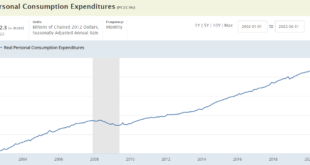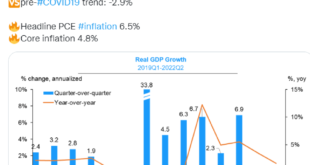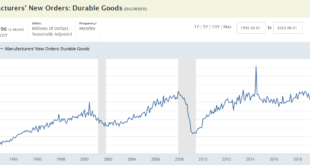European Union Inflation Rate
Read More »Personal consumption and income, personal interest income
Flattening with the fiscal contraction, but no recession yet: Thank goodness for the rate hikes and their support of personal income ;)
Read More »Open thread July 28, 2022
On statistics and causality
from Lars Syll Ironically, the need for a theory of causation began to surface at the same time that statistics came into being … This was a critical moment in the history of science. The opportunity to equip causal questions with a language of their own came very close to being realized but was squandered. In the following years, these questions were declared unscientific and went underground. Despite heroic efforts by the geneticist Sewall Wright (1889-1988), causal vocabulary was...
Read More »GDP, population, vehicle sales
Weak headline, but so far not looking as bad as most mistakenly expected with Fed rate hikes: Slowing in real terms but growing: Growing fast in nominal terms: This is telling: They’ve generally been falling off for several years, though up a bit for the last three months since the rate hikes:
Read More »Conferences, Covid, Climate
As borders reopen and Covid-related restrictions are relaxed, lots of academics are celebrating the return of in-person conferences. I’m not one of them. Although I miss a lot of aspects of conferences, I’ve tried to avoid indoor meetings since the pandemic began, and there’s no reason to change that yet. And with the climate disaster getting worse all the time, I want to minimise, or at least reduce, air travel. Another problem is that it’s become much more difficult for...
Read More »Durable goods orders, oil prices, Saudi OSP’s
Not adjusted for inflation but not showing signs of recession: If oil prices remain near current levels the inflation is over and we’re back to pre-Covid low inflation and slow growth, with a government deficit of maybe 5-6% of GDP (including the new interest expense from the rate hikes which support the economy) supporting demand and a Congress that believes the deficit has to come down to contain inflationary pressures. But I think it’s far more likely that oil prices...
Read More »The semiconductor bill and the Moderna billionaires
from Dean Baker It’s pretty funny that we continually debate the causes of inequality when we routinely pass bills that redistribute income upward. The semiconductor bill about to be approved by Congress is the latest episode in this absurd charade. To be clear, the bill does some good things. It has funding both to subsidize manufacturing capacity for semiconductors in the United States and also for further research in developing better chips in the future. Both of these are positive...
Read More »How did Sri Lanka run out of money?
5 graphs that explain its economic crisis I’ve just written an “explainer” piece for The Conversation with my longstanding colleague co-author (and former PhD student) Thilak Mallawaarachchi, trying to make sense of the crisis in Sri Lanka. Thilak contributed his extensive knowledge of the Sri Lankan economy, while I focused on the specific role of a fixed exchange-rate regime. Sri Lanka is facing its worst economic crisis in modern history. Its 22 million strong population is...
Read More »Book Review by Jayati Ghosh : The journey to greater equality
from Jayati Ghosh Economic inequalities have increased substantially across the world in the past three decades and have deepened during the COVID-19 pandemic. Thomas Piketty and his colleagues at the World Inequality Lab at the Paris School of Economics (PSE), France, have been at the forefront of tracking these changes, providing extremely useful analyses based on careful aggregation of national data on income and wealth inequality from a multitude of sources. They have shown that...
Read More » Heterodox
Heterodox






